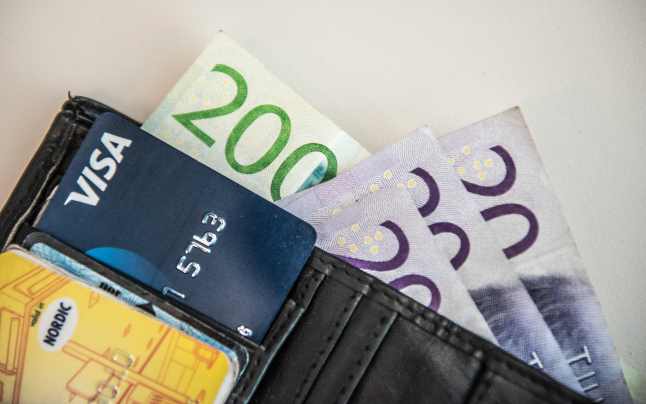What do you get if your income is high?
Sweden is to scrap its austerity tax for high earners in 2020, one of the most radical and controversial tax reforms in recent years. It comes as a result of the deal that allowed the Social Democrats and Green Party to form a government earlier this year with the support of the opposition Centre Party and Liberals.
According to the finance ministry this means that Sweden's 345,000 highest earners will get a tax cut of on average 17,700 kronor ($1,887) a year. And according to the TT news agency's calculations, those who earn 75,000 kronor a month will effectively get a tax cut of around 1,200 kronor a month next year.
The austerity tax (known as värnskatt in Swedish) was introduced in 1995 as a temporary move to consolidate the budget after Sweden's 1990s financial crisis. It was originally intended to be scrapped three years after its introduction, but it stuck around and formed part of the state income tax.
In practice, people aged above 65 can earn up to 504,400 kronor a year before they have to pay Swedish state income tax (which means income above this limit is taxed at 20 percent), and up to 703,000 kronor a year before they have to pay the soon-to-be-former austerity tax (which taxes income above the second limit at another 5 percentage units). The state income tax and austerity tax are separate from regional and local taxes, which are paid on on average 32.28 percent of your income, depending on where you live.
You can read more about how taxation works in Sweden here.

If you're on a high income, your tax bill will get reduced. Photo: Martina Holmberg/TT
What do you get if you are retired?
Old-age pensioners on a pension of more than 17,000 kronor a month are set to get a slightly lower tax bill. For a pensioner receiving 17,500 kronor a month, this translates into a tax cut of almost 100 kronor.
Pensioners on a low income, who are entitled to a so-called guarantee pension – a minimum pension regardless of a person's salary status when they were working – will see their minimum raised by 200 kronor a month. This means the guarantee pension becomes 8,596 kronor a month next year.
RECOMMENDED:

Old-age pensioners are in line for a small tax cut. Photo: Fredrik Sandberg/TT
What do you get if you live in rural Sweden?
If you're working in one of around 80 municipalities in rural and remote parts of Sweden, you are set to get a tax cut of 137 kronor a month. This decision affects around 850,000 people in total.
The cuts target municipalities that are part of Sweden's so-called regional development areas A and B, areas that struggle with challenges such as depopulation, high local taxes and dwindling welfare services. The Local explains more about who is entitled to the tax cut in this article.

Sweden is trying to boost rural areas. Photo: Helena Landstedt/TT
What do you get if you drive a car?
A complicated fuel tax change will see the price per litre of petrol effectively increase by around 0.15 kronor at the pump, an adjustment for inflation mitigated by a decision to lower the petrol tax at the same time.
Since July 2018, consumers who buy cars with low carbon dioxide (CO2) emissions get a bonus of up to 60,000 kronor. From January 1st next year, the emission limit for cars entitled to this bonus will be raised from 60 gram CO2 per kilometre to 70 gram per kilometre. The limit is set according to the Worldwide Harmonized Light Vehicle Test Procedure (WLTP), which is the EU's new way of measuring emissions.

The price of petrol will increase at the pump in 2020. Photo: Pontus Lundahl/TT
What do you get if you sell a home?
From July 1st, Sweden will reintroduce the ceiling for how much of the capital gains tax based on the sale of a property can be deferred to be taxed at a later date. When the cap was removed this figure was 1.45 million kronor, and when it is reintroduced it will be raised to three million kronor.
The deferred amount is currently taxed at a flat rate of 0.5 percent per year. According to the four-party government deal, this interest will be scrapped, but the decision has not yet been finalized.

Read more about buying a home in Sweden in this article on The Local. Photo: Janerik Henriksson/TT



 Please whitelist us to continue reading.
Please whitelist us to continue reading.
Most people can earn up to 504,400 kronor a year before they have to pay Swedish state tax (which means income above this limit is taxed at 20 percent), and up to 703,000 kronor a year before they have to pay the soon-to-be-former austerity tax (which taxes income above the second limit at another 5 percentage units). THIS IS 100% UNTRUE.
Hi Claptonfan, no, those are the Swedish Tax Agency’s own figures: https://www.skatteverket.se/privat/etjansterochblanketter/svarpavanligafragor/inkomstavtjanst/privattjansteinkomsterfaq/narskamanbetalastatliginkomstskattochhurhogarden.5.10010ec103545f243e8000166.html Note it specifically refers to state income tax, not local or regional tax — perhaps we need to make that clearer to avoid confusion?
People, in general don’t care where the taxes go to. State or Local, taxes are taxes. Most pay about 1/3 in taxes. Thanks Fru Löfgren for replying.